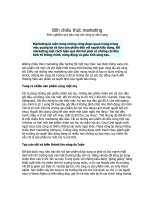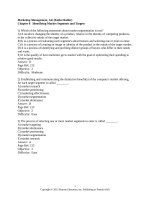Target marketing
Bạn đang xem bản rút gọn của tài liệu. Xem và tải ngay bản đầy đủ của tài liệu tại đây (3.04 MB, 49 trang )
Target
Marketing
Lectured by Khoa Nguyễn
Chapter Questions
• What are the different levels of market segmentation?
• How can a company divide a market into segments?
• How should a company choose the most attractive target markets?
• What are the requirements for effective segmentation?
Case study
1.
Segmentation
Segmentation Process
SEGMENTATION
DIFFERENTIATION
Create Value
TARGETING
POSITIONING
FOUR LEVELS OF MICROMARKETING
Segments
Niches
Local areas
Individuals
Segment
Marketing
What is a Market Segment?
Market
Segment
• A market segment consists of a
group of customers who share a
similar set of needs ad wants.
Flexible Marketing Offerings
Naked solution: Product and service
elements that all segment members value
Discretionary options: Some segment
members value options but not all
Preference Segments
• Homogeneous preferences exist when consumers want the same things
• Diffused preferences exist when consumers want very different things
• Clustered preferences reveal natural segments from groups with shared
preferences
Niche Marketing
Local Marketing
Individual
Marketing
What is Customerization?
Customerization combines
operationally driven mass
customization with customized
marketing in a way that
empowers consumers to design
the product and service offering
of their choice.
What is customization? What is
personalization?
• Chris Anderson explains the long tail
equation:
The Long Tail
• The lower the cost of distribution, the more you
can economically offer without having to predict
demand;
• The more you can offer, the greater the chance
that you will be able to tap latent demand for
minority tastes; and
• Aggregate enough minority taste, and you may
find a new market.
Segmenting consumer market
Geographic
Demographic
Psychographic
Behavioral
Geographic segmentation
Demographic segmentation
segmentation by age
segmentation by life cycle
segmentation by gender
segmentation by Psychographics
segmentation by
Behavior
• Occasion
• Benefit
• User status
• Usage rate
• Loyalty









